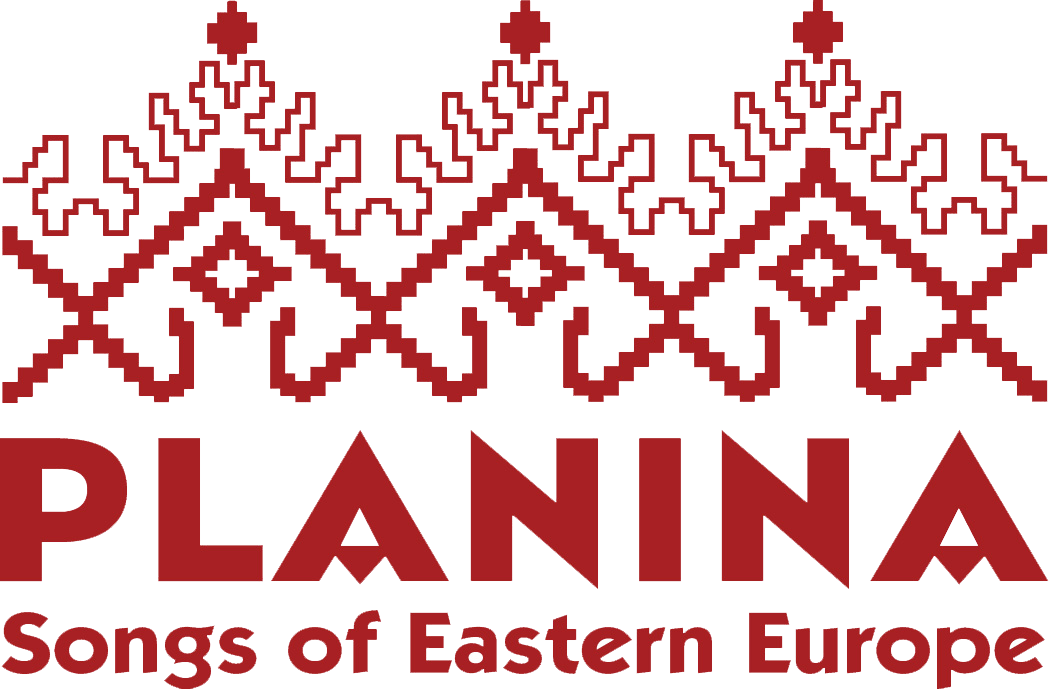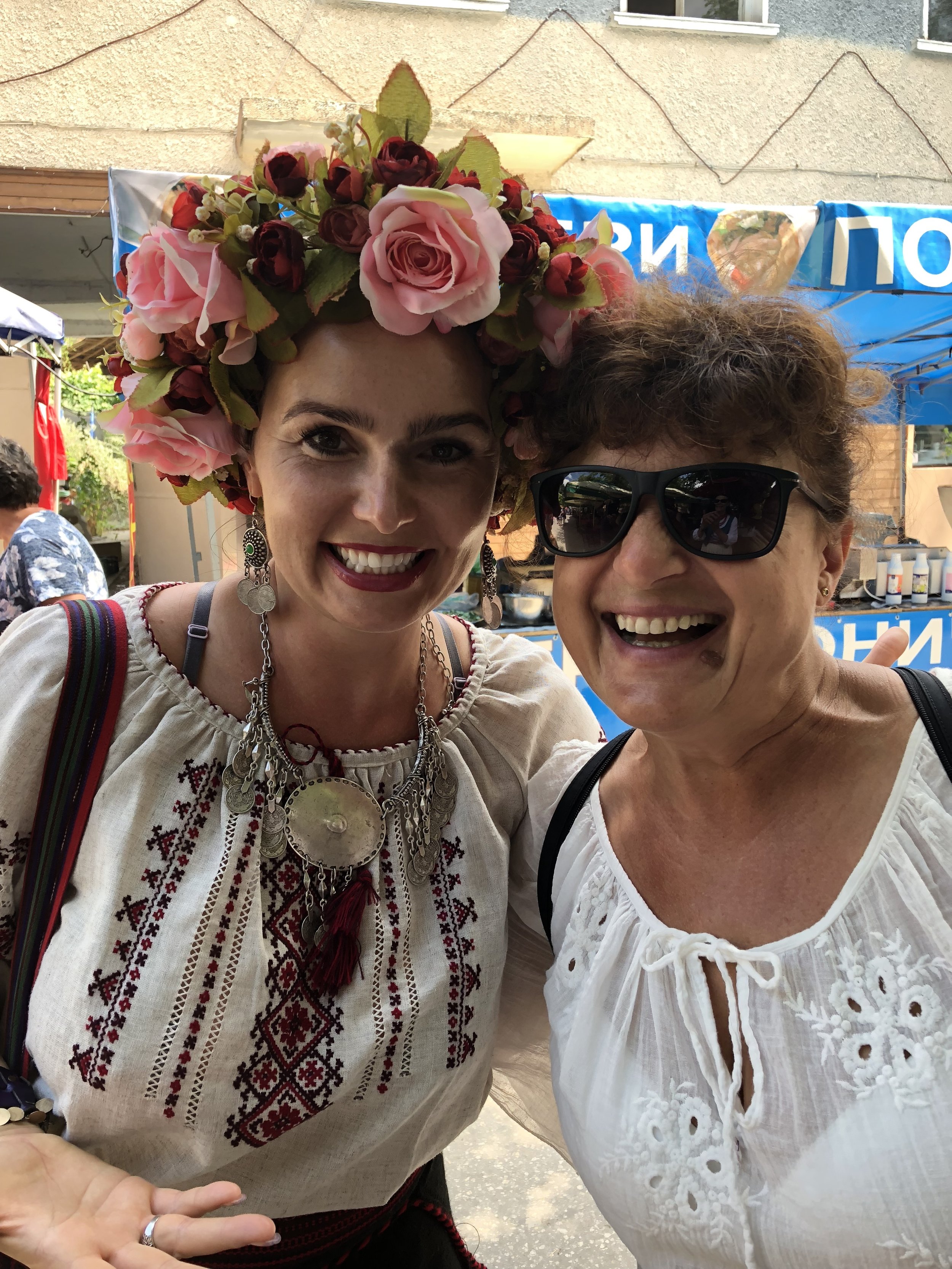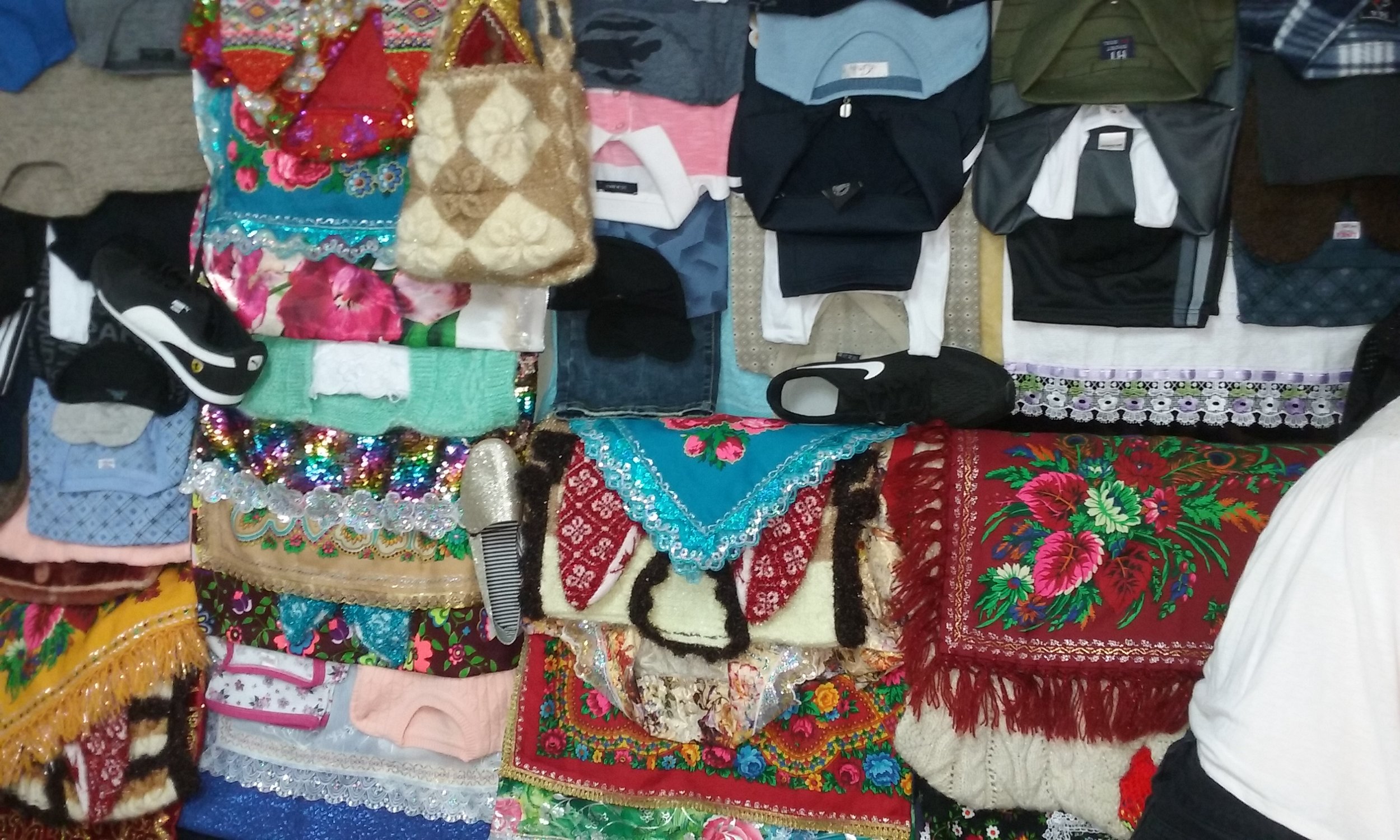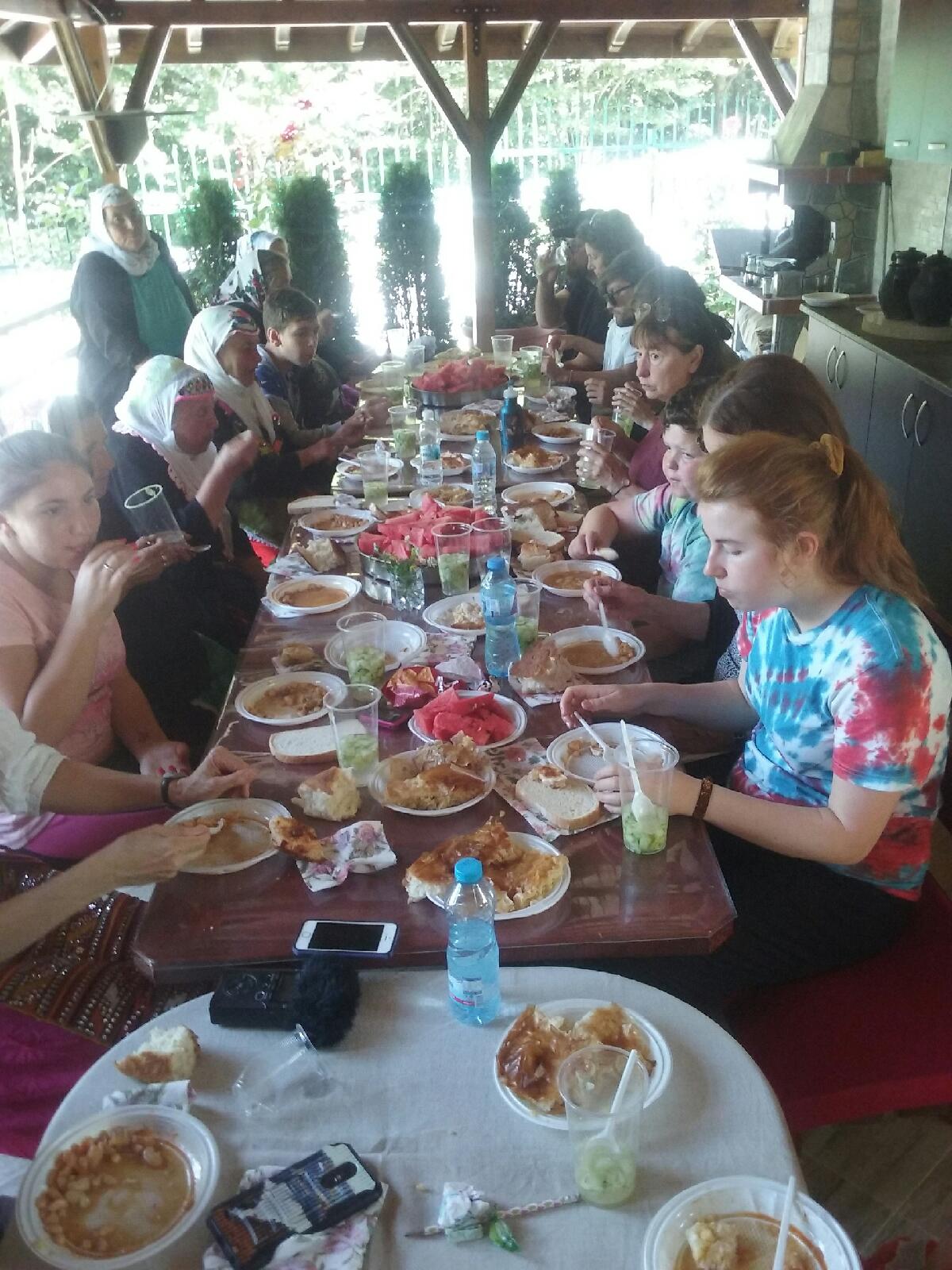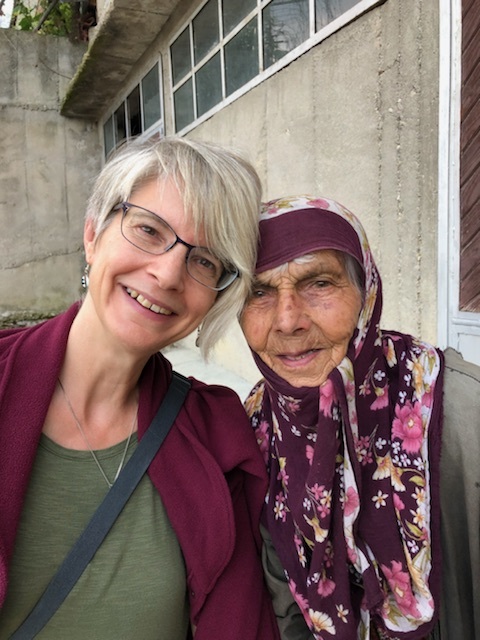Planina's Bulgaria 2018 Chronicle
Many, many thanks to all the donors who helped us cover expenses for our Bulgaria trip! We visited three villages, worked with numerous singers, had several performances of our own, and experienced unprecedented musical and cultural opportunities. Thank you, thank you for your support!
Dan Osterman
Most Planina members left Dorkovo on July 30th to catch flights back home to Denver. So hard to say goodbye to beautiful Bulgaria and our warm and friendly teachers in the villages. But also difficult to part with Dan Osterman, bright, curious, and very patient with the rigors of travel. Dan stayed awhile longer in Bulgaria with his mother, Planina member Laura Olson Osterman, trip organizer extraordinaire, for a few more days while Laura did additional research on folk traditions in the villages. Dan joined Planina on stage in a traditional costume - pictured here - for some songs. We loved traveling with him!
- S.K.
"Mom, are you a celebrity in villages?"
Dan Osterman asked this question as we walked through the night to our cars in Draginovo after attending an impressive street party one evening in connection with a Muslim wedding (see the post "The Wedding Dance"). As we folk danced with family and friends of the bride and groom, several people asked us if Laura had come with us; she had, but the crowd was so large it was hard to locate individuals. On leaving the party, a group called out to Laura and spoke with her for several minutes. After the conversation Dan asked this funny question. The answer is, of course, yes, and Planina members are the richer for Laura's research and deep connections with villagers developed over many years. In this photo Laura talks with residents of Dorkovo during a daytime party with lots of singing. Thanks in large part to Laura, Planina members experienced a wonderful intensity in our conversations and singing with villagers in the Pirin and Rhodope villages we visited. Laura translated for some of us (other Planinas had some command of Bulgarian); organized numerous field trips; and resolved many of the issues that arise with foreign travel. We are deeply grateful to Laura for all she did for Planina to make this trip so rich and memorable!
- S.K.
Savy's Report
After studying folklore for a year in a Baltic country situated along regions that Planina draws upon for much of our repertoire, I have gained some interesting cultural perspective. As it turns out, I arrived in Bulgaria directly from a folk music festival in Kaustinen, Finland, where I performed a rather jazzy version of “As më jep,” which I had shared with a small ensemble I joined while in Estonia. (Image: Sofia Ethnographic Museum)
I was so happy to rejoin with Planina to travel through Bulgaria. Reflecting on the trip, I am overcome with gratitude and inspiration. Not long after we gathered in Sofia we were singing and dancing along with the locals! I was excited to gain a deeper awareness of the culture and history. The Planinans gathered for a very informative historic walking tour through the city of Sofia and visited ethnographic museums. For me, learning about traditions which connect with the lyrics of our songs, and how music is expressed in Bulgarian culture, was invaluable. I also recognized very interesting similarities with Bulgarian traditions and some calendrical practices I have seen in Latvian and Russian traditions. Contextualizing the songs culturally and regionally enriches and deepens my understanding and connection with the music.
Leaving the hustle and bustle of the capital and venturing to the first village of Breznitsa was quite the adventure. After winding through picturesque valleys and lush mountain roads we arrived to meet our very kind hosts.
(Image: Fatme, one of our lovely hosts, posing in Galina's new Ukrainian outfit in Breznitsa)
Not long after arriving, Nicholas and his friend Ernie pulled out their instruments to work on some music. Although it was the first time I was meeting them it wasn’t long before we were all jamming on the patio and working out new instrumental parts for the group.
Our teachers in Breznitsa were phenomenal and we were singing along in no time. It was truly like a dream to make music with such wonderful people in the backdrop of a cozy village surrounded by mountains. One thing that particularly stands out to me about Bresnitza is the beautiful call to prayer from the Mosque. At scheduled times a beautifully ornamented voice would just cut through the air and we could not help but to take pause and appreciate the moment.
Galina and I took early morning walks along the hilltops to get a view of the village. Surrounded by mist- covered mountains, we shared songs and stories as shepherds led flocks up to graze along the trees and meadows. During one of our walks we discovered a traditional wooden washing drum built into the passing mountain stream.
Bulgaria is known for being a farming country and there are many animals roaming the streets of the villages. In each village we visited we made many furry friends. Our mascot for Breznitsa was Peanut the kitten who lived on the porch of the home where Laura stayed with her son Dan.
Galina with a farm rabbit we met on one of our walks in the mountains of Breznitsa
From Breznitsa we made our way to Draginovo to meet our old friends Milyo and Elka. Elka gave us a tour of the local chitalishte [cultural center], which contains a small ethnographic exhibit they set up with help of the villagers. She explained the exhibit, which shows a bride prepared for a traditional village wedding.
(Above: Draginovo ethnographic display of bride prepared for village wedding)
We later met with the local ensemble and attended their rehearsal. Near the end we were invited to sing and dance along with the locals well into the night. The following day we met for a music workshop with members of the ensemble. They brought along a village elder who shared some very special songs. After really honing our musical skills with the locals we shared some of our repertoire at a special concert in an art gallery in Velingrad.
Back in Draginovo, Elka told us about an upcoming wedding and told us we were invited to view the dowry. We were brought into a room behind a village home where we saw elaborate and flashy handmade scarves, socks, shoes, blankets and many other items lining the room from floor to ceiling. We would later return to participate in part of the extensive wedding celebrations by dancing in the street with the wedding party and guests. We would spend our final hours in Draginovo soaking in the mineral pools before heading to the nearby village of Dorkovo.
Wedding Party in Draginovo
When we arrived in Dorkovo the folk music festival was in the process of being set up and many ensembles were arriving. Laura was asked for an interview with the Bulgarian national radio. We then prepared for the parade and opening ceremonies of the folk music festival, which featured many impressive international ensembles! When it was our turn to perform, we shared songs we had learned from the surrounding areas which were very well received! Many of us then explored the festival market which included crafts by local artisans and of course farming equipment. Throughout the festival we met with members of a couple of different Bulgarian ensembles and did a workshop with the local musicians of Dorkovo. BWeesides having the pleasure and honor of preforming, we were able to see Milio perform with the Draginovo ensemble, which was a real treat! We concluded our trip with a very special visit to Janko, who is an old friend to many of the members of Planina. We spent the evening sharing songs as he and his wife brought out plate after plate of delicious homemade dishes, wines, and liquors. It was the perfect end to a remarkable journey through the Balkans.
- S.P.
Images from top left to bottom right -
Laura getting interviewed by Bulgarian national radio in Dorkovo
One of the international ensemble performances during the opening ceremonies in Dorkovo
Bells and harnesses at the Dorkovo festival market
Planina members during a workshop in Dorkovo
Laura with members of a Bulgarian ensemble
Milio with the Draginovo ensemble
Making Friends in Dorkovo
Prior to marching in the opening night parade of the Dorkovo Festival, Planina members got reacquainted with some members of the Dorkovo Ensemble, from whom we've learned songs in the past. Pictured here with Ensemble members are Mallie Kermiet and Savy Powell of Planina.
- S.K.
Planina member Mallie admires the heavy wool coat of a Dorkovo Ensemble member.
- S.K.
An audience member asked to be photographed with Galina, who is wearing a headdress from Ukraine.
- S.K.
In Dorkovo
Planina’s last trip to Bulgaria was in 2005. That year, we spent a week in the village of Dorkovo and attended their festival at the end of the week. I’ve been to Bulgaria several times in the past 13 years for my research, and went back to visit Dorkovo and give the ensemble our CD (which contained several songs we had learned from them) in 2013. But I haven’t attended the Dorkovo festival since 2005, so I was curious to see who in the village I would remember, and who would remember us.
On the first night, after we sang in the opening ceremonies, the headline band was warming up as we walked along the main street set up with bars and grills, I found Julie and Jim sharing mutton steaks with a couple they had just met from Sofia who are folk dance aficionados and regulars at the festival. Mutton steak is a local specialty, apparently—predictably, I found it to be tough meat, but it was well-seasoned and tasty. The couple was friendly and we talked politics and folk music.
Later that evening, I was thrilled to witness Julie and Jim’s reunion with their hosts from 2005, Nadka and her son Kostadin, depicted in the photo here. What a heartfelt scene that was. I loved the hands-to-heart gesture that Julie and Nadka mirrored to convey their connection – the international language!
The next day, when the Dorkovo ensemble came to the house where we were renting rooms to sit at the outside table and exchange music, snacks and rakiya, the couple from Sofia from the night before showed up too, to our surprise. They danced to many of the songs and tried to accomplish the local dance “Dzup-dzup” that we had learned—incompletely—in 2005. I was gratified to see that even these dance aficionados were having trouble reproducing dzup-dzup!
The majority of the group we traveled with this time are newer members of Planina and had never been to Bulgaria before. It felt like a completed circle to see them singing Dorkovo’s songs with the ensemble who originally taught them to us. We alternated versions of Dorkovo’s hit song “Yane, Yane”—first theirs, then ours. Mutual admiration all around, several shots of rakiya. Ernie, Nicholas’s friend who joined us for this adventure, filmed the occasion using the videocam which I bought with a grant from CU in 2012.
We also sang with the women the a capella song, also on our Telegram on the Wind CD, “Ne dui more vetre.” With the whole ensemble we sang several other songs we remembered from our time there. We forgot to ask for the title tune of our CD, “Telegrama doide” [A telegram has come], in part because Thorn was not there. Thorn and Jessica had monstrous issues with their airline tickets, and didn’t end up coming, although they had planned to. We did a reprise of the one Aromani song we had learned from the Aromani ensemble, “La Valya,” also on the “Telegram” CD. Although the Aromani ensemble is no longer active, a few of the singers knew this songs and sang it with us. A woman who used to sing in the Aromani ensemble later sang another beautiful Aromani song for us with her sister, who happened to be in the village with her ensemble from a different Rhodope town. She really wants us to learn it – she even wrote out the translation into Bulgarian and had me specially record that so we’d be sure to have it.
We capped off our time in Dorkovo with a visit to our favorite Dorkovo resident, Yanko Duzov. Yanko apparently no longer sings with the ensemble, but otherwise hasn’t changed a bit.
We remembered that I had first met Yanko in January, 1990, when I had a Fulbright for studying Rhodope singing and came to the village for the celebration of Babinden, the celebration of the Bulgarian midwife—he was the village’s mayor at the time.He is a consummate host and party facilitator, and plied us with homemade red and white wine and rakiya, tomatoes just picked from the garden, Bulgarian white cheese, and some leftover grilled meats. We delivered to him a gift specially picked out and purchased by Valerie and carried over the ocean by Rose—a small flask of Colorado whiskey—as well as a Colorado T-shirt and a scarf for Kate (pronounced Kah-tay), Yanko's wife. (The return gift was two liters of his homemade rakiya, which made it home to the US safely – party time!). Yanko wanted to know where was “moi chovek” [my person]—a phrase he and Valerie use to say to each other during our visit in 2005,which I translate as something like “you are a person who suits my soul!” Alas, Valerie could not join us on this trip because of work commitments. It was a kick to introduce our newer members to Yanko and Kate. And Yanko was thrilled to be serenaded, at 11:00 on a Sunday night, with Bulgarian and Russian songs sung at the top of ten well-wetted throats, accompanied by Nicholas’s inspired accordion playing and Ernie’s sousaphone. Of course Yanko sang along with every song, and no neighbors complained. A fitting end to our trip, memories indelibly etched and friendships formed and refortified.
- L.O.
The Wedding Dance
During our stay in Bulgaria, Planina attended a party in connection with a Muslim wedding in the village of Draginovo. We had met the bride and some of her family earlier in the week when we visited the bride's dowry (see below). In addition to dancing with her and the groom in a folk dance that stretched a block with two full dance lines, we were greeted enthusiastically by the village singers who had taught us new songs and also by our friendly server from the Draginovo hotel we stayed in earlier in the week. It seemed the whole village was at the party that night.
- S.K.
The Wedding Dowry
While in Draginovo, we were invited to see the dowry for a traditional Muslem wedding that would be taking place that weekend. The bride’s house was in a neighborhood up a steep hill, and the items were on display in a separate building, like a small garage, behind the house. The items filled all four sides of the room. On one wall were gifts the family would be giving to friends and relatives, and on the other walls were the bride’s dowry that she would be taking with her. The bride’s mother had been sewing and knitting these items for many years. The bride graciously came out and met us, passed out festive bread and gave each of us a small gift, then changed into a special dress to pose with her fiancé for us.
- J.L.
Planina Concert in Velingrad
Our friends Milyo and Elka Kepcheleva are from Draginovo but have spent a fair amount of time over the last many years living in Boulder, CO. They are involved with the cultural center and the folklore group in Draginovo, and they lined up many experiences for us while we were there.
Milyo arranged for Planina to present a concert on July 25 in Velingrad, a larger town near Draginovo. Velingrad is a spa town and a popular summer resort.
We sang at an art gallery with a top-notch sound system and sound technician, for an audience of about 30. Having just spent several days singing with the fearless singers of Breznitsa, we performed well and the audience was extremely enthusiastic.
Most surprising was that the mayor of Velingrad sent a cultural representative who read a proclamation (shown here), commending Planina for studying Bulgarian folk music and for coming to Velingrad. She gave us a bouquet of sunflowers (Bailey is holding the bouquet somewhere else on this page) and handed me a bag that contained a plaque, some souvenirs, and 12 little bunches of zdravets leaves: wild geranium, traditionally given as a greeting.
J.L.
Breznitsa Costumes
The Breznitsa groups brought local costumes for our group members to try on during both of the big parties they threw for us. Here, Mallie and Galina are the lucky members chosen to “dress” at the lamb event; they are joined in one shot by two of the Breznitsa kids.
- L.O. and J.L.
With Salih
Laura—sporting one of the costumes that the Breznitsa folks brought for us to try on—writes down lyrics with the help of one of our teachers, Salih Bukovyan. He directs one of the traditional folklore groups in Breznitsa and works in the mayor’s office.
On the evening of the 22nd, Salih invited us up to his "music hut,” where he was working with a student. Besides directing a group of women singers, Salih is a specialist in a traditional local style of music in which a sole male singer plays the drŭnka (a small, tambura-like instrument, see photo above) and sings many-versed ballads about historic events and stories ranging from funny to grisly.
We climbed a steep, rutted dirt road that leveled out onto a ridge. As we walked we could look down to our right and see the town, and down to our left and see wild country. We passed a tree laden with almost-black small plums and sampled them.
It was almost nightfall when we arrived at the hut. Stepping down from the road, we passed through a gate and onto the threshold of the hut, where we sat at the picnic table. Inside the hut I could see a colorful blanket and rug and some musical instruments, but we did not go in.
Salih and his student played, Salih sang, then he handed around the instruments for us to feel and try out and we talked, with Laura translating. Salih has studied this style from older singers as the tradition has slowly faded, and he has also studied from books, memorizing many songs.
Down in the valley, little lights were twinkling on all over town. In the other direction, on the opposite side of the ridge, lightning was playing in the clouds. I was struck by the sincerity of Salih’s pursuit, the sincerity of our appreciation for all we were experiencing, the thought of how much music might have been made through the years at this little hut, and the thundering beauty of nature.
- J.L.
Wherever Planina member Nicholas Caputo was found was usually where the party was—the accordion party, that is! Self taught in accordion after years of piano instruction, Nicholas charmed Planina members and villagers alike with his alluring, passionate, and energetic melodies, both traditional and those he composed. Added bonus: he brought the fabulous Bailey Harper on our trip. She fit right in with our Planina group, and, as a professional dancer, Bailey folk danced like she’d been doing it all her life.
- S.K.
Nafie and Nusha
Nafie and Nusha, two of our teachers in Breznitsa, are longtime friends and have sung together for years. (In the background, Bailey Harper, one of the significant others with Planina on this trip.)
Nafie (center in the photo) was also host to most of us. One treat she cooked was zelen bob (green beans): wide, flat, Italian-style green beans from her garden, made with some kind of a roux and garnished with homemade yogurt seasoned with garlic, scallions and salt. A true culinary highlight.
- J.L.
Nafie kissing Dan, to Dan’s half-horror, half-enjoyment . . .
- L.O.
A Lesson in Bulgarian
Planina member Mallie Kermiet learned some Bulgarian before the trip, and she was pleased to find she could have conversations with Bulgarians! Her past experience with Russian helped a lot as there is some overlap in the languages. Here Mallie tries out her Bulgarian with our host in Breznitsa, Nafie, who held Mallie's hand throughout the conversation. We grew so fond of Nafie who provided us with great food, a beautiful place to stay, and many, many songs.A Lesson in Bulgarian
- S.K.
Somewhere in the Pirin Mountains
On Monday, July 23, our host took us to the mountains again, this time for a lamb roast. Probably 35 people altogether. These three women (left) are a trio of sublime singers. They are teenagers, although one is married and a mom. The location is a public picnic house that anyone can use on a first-come basis. The property has a big shelter with a wood-burning stove for winter warmth and sliding windows to keep out the wind and rain if needed, or be completely open for a nice day like we had. A short distance across the field from us was another small building with running water and a built-in place to grill (our lamb was delivered). What an incredible amenity! What a party place, and it held all of us in comfort. Our two groups sang for eight solid hours, the women brought costumes for folks to try on, and we danced in the field between the buildings. The groups took turns singing and frequently sang together when they knew the same songs. The host group was incredibly generous musically. And, once again, a fabulous feast!
Over the past couple of days, as our host's daughter, Fatme, was inquiring whether we wanted this outing, she would say, "Let me know so we can order the lamb," and every time she would say "order the lamb," she pulled her finger across her neck. Fatme has been our support staff, cooking meals and shopping. She is a very sweet young woman who lived in Sofia for 10 years and in the US briefly, before deciding she prefers village life. She's a textile engineer whose plant is in a neighboring town a bus ride away.
- J.S.
Nafie playing Ernie’s sousaphone, to general merriment.
L.O.
The Food?
It's fabulous. And plentiful. Bulgarians are amazing hosts and each meal is a feast!
This party took place on Sunday, July 22, at a Breznitsa resident's mountain villa. They served us beans and meat cooked in ceramic pots in a fire pit, four different kinds of banitsa (a Bulgarian specialty involving filo dough and fillings, either savory or sweet), watermelon, and copious amounts of cucumbers.
Members of both folklore groups came and sang for hours, some a cappella singing and some accompanied by an indefatigable accordionist, a tambura player and various drummers. Many strong male as well as female singers.
- J.S.
Photo of the pots of beans, and two of the cooks, at the workshop in Breznitsa. It takes a village . . .
- L.O.
Who's the Guy with the Horn?
Ernie Williams plays the sousaphone. He lives in Gainesville, FL, and is a longtime friend of and musical co-conspirator with Planina member / accordion player Nicholas Caputo. They played street music in several countries en route to Planina's meet-up in Sofia. Could Ernie join our trip? Yes! Ernie learned the bass line for a number of Planina tunes and accompanied us in our performances and our adventures.
They found moments to do street music (or in this case, field music) in the Bulgarian towns we visited, too—sometimes accompanied by Savy on viola, with Bailey dancing.
- J.L.
Joining us from Estonia
We are so happy that former Planina member Savannah Powell joined us on this trip. Savy lives in Estonia, where she is studying folklore. Many Planina fans will remember her silvery soprano voice and soulful viola playing. She and Laura share a laugh as Planina learns a new song from traditional singers in Breznitsa.
- S.K.
Our first lesson in Breznitsa.
Breakfast
Under a grape arbor. The night before, we drank rakia made from grapes from these vines...
- J.S.
Breznitsa at last!
Nothing could prepare Planina members for the Muslim village of Breznitsa, Bulgaria and its welcoming residents. Beautiful flower and vegetable gardens, fruit trees, hay barns with horses, cows and sheep in the winding lanes. Here, a 90-year-old woman greets Laura on our first afternoon in Breznitsa.
- S.K.
On the way to Breznitsa
Here we are at a rest stop on the way to our first village, Breznitza. The peaches were fabulous, as was the Koka Kola. According to one connoisseur (Laura's son, Dan) it tastes just like Coke.
- J.S.
First Contact
Julie gets a thumbs up from the cab driver as they sing while traveling from the airport to the apartment where some of us would be staying in Sofia.
- J.S.
